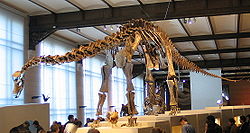Diplodocimorpha
| Diplodocimorphs Temporal range: Late Jurassic to Late Cretaceous, 157–90 Ma |
|
|---|---|
 |
|
| Kaatedocus skeleton, Brussels | |
| Scientific classification | |
| Kingdom: | Animalia |
| Phylum: | Chordata |
| Clade: | Dinosauria |
| Order: | Saurischia |
| Suborder: | †Sauropodomorpha |
| Clade: | †Sauropoda |
| Superfamily: | †Diplodocoidea |
| Clade: |
†Diplodocimorpha Calvo & Saldago, 1995 |
| Subgroups | |
Rebbachisauridae
Dicraeosauridae
Diplodocidae
Diplodocimorpha is a clade of extinct sauropod dinosaurs, existing from the Late Jurassic until the Late Cretaceous. The group includes three main families and some other genera, Rebbachisauridae, Dicraeosauridae and Diplodocidae, the latter two forming Flagellicaudata. The name was first used by Calvo & Salgado (1995), who defined it as "Rebbachisaurus tessonei sp. nov., Diplodocidae, and all descendants of their common ancestor." The group was not used often, and was synonymized with Diplodocoidea as the groups were often found to have the same content. In 2005, Mike P. Taylor and Darren Naish reviewed diplodocoid phylogeny and taxonomy, and realized that Diplodocimorpha could not be synonymized with Diplodocoidea. Whereas the former was defined node-based, the latter was branch-based. In 2015, Emanuel Tschopp, Octavio Mateus and Roger Benson published a specimen-based phylogeny on diplodocid interrelationships, and supported the separation of Diplodocimorpha. Haplocanthosaurus was found to be more basal than rebbachisaurids, and therefore outside Diplodocimorpha, but closer to Diplodocus than Saltasaurus, and therefore within Diplodocoidea. The below cladogram follows the findings of Tschopp et al.
...
Wikipedia
